- Home
- Gore Vidal
Lincoln Page 5
Lincoln Read online
Page 5
Hay grabbed Tad’s hand and pulled him, squeaking, to his feet, while Willie ran into his mother’s bedroom, shouting, “Mamma!”
Gracefully, Seward introduced Senator Sumner to the President-elect. Charles Sumner was not only remarkably handsome but, unlike most modern statesmen, he was cleanshaven. Hay had already sent out a curiously uninteresting story on the wire-service to the effect that Lincoln would be the first bearded president in American history. Face-hair was now respectable or de rigueur, as Hay’s French-speaking Providence, Rhode Island muse, Mrs. Sarah Helen Witman, would say. Since a brief engagement to Edgar Allan Poe, Mrs. Whitman had worn only white, like a shroud; she had also sprinkled herself with ether in order to suggest a terminal illness of the sort that had once ravished Poe; and entirely overwhelmed poetry-loving Brown undergraduates.
“I would’ve known you anywhere,” said Lincoln. “From your pictures.”
“I might not have known you, sir, with the beard of Abraham, you might say, so newly acquired.” To Hay’s ear Sumner sounded like so many of his fellow Boston Brahmins, more English than American. Even so, the voice was singularly beautiful in its way, thought Hay, the Westerner, as he slipped into the bedroom, where, to his delight, he found Madam and a colored maid opening a row of trunks. As Willie entered the adjoining bedroom, she said, “Take Tad with you.”
“No,” said Tad.
“Yes!” said the Hellcat with a sudden change of expression that everyone, including the remarkably spoiled Tad, understood and feared. Whimpering with self-pity, the child obeyed. “Oh, God, will this never end?” Madam appealed to Hay. “I feel seasick from the cars. I hate these trunks.”
“Well, you’ll soon be settled in the White House. Can I help?”
Madam was holding up a dress of blue velvet; she examined it carefully for signs of damage. “I am a martyr to moths,” she said to herself, but spoke aloud, a curious habit to which Hay had got used during their days of confinement aboard the cars. When Mrs. Lincoln wanted to—or was able to (he could never tell whether her erratic behavior was calculated or simply uncontrolled)—she could charm anyone on earth, as she must have charmed the most ambitious young lawyer in Springfield, not that Lincoln would have needed much charming, for she was a Todd and lived with her sister whose house on the hill was the center of the town’s social life and it was there that she had been courted by all the other ambitious lawyers, not to mention Judge Stephen Douglas; as a child in Lexington, Kentucky, she had known Henry Clay, the only American statesman, except for Parson Weems’s Washington, that Lincoln had ever openly praised.
Madam gave the dress to the maid to hang up; turned to Hay with a sudden, almost girlish smile. “Between you and me, Mr. Hay, there is more to jest about in all of this than I might have suspected, for all the weariness as well.”
“I’ve noticed that, too, Mrs. Lincoln.”
But then the smile was gone. She had heard the sonorous voice in the next room. “Who is that with Mr. Lincoln?”
“Senator Sumner.”
“Oh.” Hay could see that she was torn between timidity and curiosity, which she resolved by going to the half-open door and looking into the parlor. “He’s every bit as handsome as they say,” she said in a low voice; this time to Hay and not to herself.
“He hasn’t stopped talking since he arrived.”
“At least he seems to have driven away Mr. Seward, that abolitionist sneak.” Mary turned back into the room.
“Surely, Mr. Seward’s no sneak—”
“Well, he was a rabid abolitionist once upon a time. Now, of course, he’s gone and changed a few of his spots, but right or wrong, Mr. Sumner never changes. I do hope all these abolitionists never forget that Mr. Lincoln is not in favor of abolishing slavery. He simply does not want to extend it to the new territories. That is all; all!” In the last twelve days Hay had heard her say this so many times that he had ceased to hear the words. But then Mrs. Lincoln was in a difficult position. The Todds were a great slave-holding Kentucky family; worse, they were, many of them, secessionists, a source of much embarrassment to her, not to mention to the new president. “Find me Mrs. Ann Spriggs.” This was unexpected.
“Who is that, Mrs. Lincoln?”
“She is a widow who has—or had—a boardinghouse on Capitol Hill. That’s where we lived when Mr. Lincoln was in Congress. She’s still alive, they say, and I’d dearly love to see her again and”—the girlish smile returned—“and show off!”
“For that,” said Hay, again charmed by Madam, who had just taken over from the Hellcat, “I’ll find her, Mrs. Lincoln.”
With a wave, Madam dismissed him. She is going to be a very royal First Lady, he thought, as he returned to the parlor, hoping to escape the senatorial presence unremarked. But Hay’s appearance stopped Sumner in midsentence. “Sir?”
“This is my secretary’s secretary, Mr. Sumner. John Hay.”
“Oh, yes.” They shook hands. Hay felt a certain awe, seeing so famous a man up close. “I heard you speak, sir,” he said. “Two years ago. In Providence. I was at Brown.”
“I remember the speech.” Sumner had lost interest. Hay looked at Lincoln: should he stay? The Tycoon raised his chin, which meant, no. “I’m curious to see which is taller, Mr. Sumner or myself, but when I suggested that we measure backs …”
“I said”—Sumner was not about to allow anyone to say his lines for him—“the time has come to unite our fronts and not our backs before the enemies of our country.”
“Yes, that’s just what you said.” Lincoln turned to Hay, “Word for word,” he added. With a low bow, Hay left the two statesmen to what, he suspected, was going to be a most disagreeable session. Sumner had supported Lincoln in the election; but now Sumner feared Seward’s ascendancy over the new President. Sumner wanted Lincoln to abolish slavery in the seceded states. But Lincoln was not about to do that, not with Virginia and Maryland on the verge of secession, and half a dozen border-states, including Kentucky, ready to follow. On the train from Springfield, as Hay observed the large crowds that cheered the President-elect (everywhere except in New York City, where there was a powerful pro-secessionist movement), he had come to think of Lincoln as a beleaguered fortress, with cannons firing at him from every direction; a fortress waiting to be relieved by … But Hay did not know by what. No one knew what was in Lincoln’s mind. Particularly not the boisterous young men crowded at the far end of Willard’s bar, drinking cocktails at ten cents a glass.
Hay pushed through the swinging doors of the long bar just off the main parlor of the hotel, where ladies sat beneath a gilded dome, drinking tea and casting disapproving—when not envious—looks at the men as they entered and left the bibulous good fellowship of the smoky, long bar.
Hay found the smooth-faced—the boy could but would not grow whiskers—Robert Lincoln, talking to a short, bright-eyed young man who was already beginning to go bald. Robert introduced Hay to the young man, saying, “He graduated from Harvard the same year you graduated from Brown.”
“Well, that’s a bond, I guess,” said Hay, ordering a brandy-smash.
The Harvard graduate was examining Hay curiously. “You’re one of Mr. Lincoln’s secretaries, aren’t you?”
“Yes, sir.”
“Everyone says Johnny’s too young.” Robert smiled shyly; but then he was shy; and a bit solemn. Two years earlier he had been uprooted by his father and sent east to enroll at Harvard. But since he had not been scholastically ready for that great university he had been obliged to spend a year in preparation at the Phillips Exeter Academy in New Hampshire. It was said that Mr. Lincoln wanted the best possible education for his oldest son just as he himself had had the very worst, which is to say practically none at all. After the debate with Douglas and the lost election, Lincoln decided to travel east to see how his son was getting on at Exeter. It was on this trip—coincidentally, hardly any claimed—that Mr. Lincoln was prevailed upon to speak third in a series at New York’s Cooper Institut
e. He did so on February 27, 1860. The liberal editor of the New York Evening Post, William Cullen Bryant, chaired the meeting, while the city’s most powerful editor, Horace Greeley, sat in the audience. The next day Lincoln was known to the entire nation. With characteristic eloquence, he had accepted the slavery at the South, but he had opposed its extension elsewhere. This pleased a majority of the Republicans, while arousing great suspicion among Douglas’s Northern Democrats, not to mention the Democrats of the South. After Lincoln’s triumph at the Cooper Institute, he spoke elsewhere in the northeast, and in the course of this triumphal passage, he took the Republican nomination away from the powerful Seward as well as from that passionate anti-slavery man Salmon P. Chase of Ohio. “So if it hadn’t been for you, Bob,” Lincoln liked to say, “being up there at Exeter, I’d never have been nominated or elected.” Robert appeared to believe this. Hay did not. From the beginning of his close association with Lincoln—less than a year but it seemed like a lifetime—he had been delightedly conscious of the Tycoon’s endless cunning. There was nothing that Lincoln ever left to chance if he could help it. He was a master of guiding public opinion either directly through a set speech to a living audience or, indirectly, through an uncanny sense of how to use the press to his own ends. He was also the first politician to understand the importance and the influence of photography; no photographer was ever sent away unsatisfied. He had even grown a beard in order to soften his somewhat harsh features; and to make himself, at least in appearance, the nation’s true Father Abraham. It was thus with characteristic forethought he had sent his son to New England to school so that with no other apparent end than ordinary paternal care, he might, when the time came, go east—and seize the crown.
“Hey, Johnny! Hasheesh Johnny Hay!” Hay turned and recognized the face but not the name of a fraternity brother from Brown. They made the fraternal handclasp of Theta Delta Chi. Since the young man was drunk, Hay pulled him to one side, out of range of Robert Lincoln, who was very much enjoying his anonymity, soon to end when the newspapers got through illustrating, one by one, the entire Lincoln family. Hay also did not want anyone to learn his college nickname.
“What’re you doing in town?”
Hay recalled that the brother was Southern; was glad that the brother did not know of his appointment. “Oh, I’m just here for the inaugural.” Hay was casual.
“If there is one!” The drunken youth scowled as darkly as such a foolish face could. “Me, I’m going home to Charleston to fight, if we have to. I guess you’re for the Yankees, aren’t you?”
“I guess so,” said Hay.
“Well …” Words did not come easily to the soon-to-be-rebel. But a sheet of paper did materialize in his hand. “I take the boat in the morning. But as we’re brothers, I leave you this. My richest legacy.”
Hay looked at a neatly printed list of names and addresses; some were curiously cryptic, like The Haystack—his eye caught that at once—or The Blue Goose, The Devil’s Own … After each name or title there was a number. “They’ve been numbered from one—which is the best—to five, which is pretty bad. Three of the brothers put this list together. Took more than a month to do. Now they’ve all gone South. Anyway, you can give copies of it to anybody you like, I guess. But they did say they’d prefer that only the Delts got the real good of it. ’Bye, Johnny.”
It took Hay several days to figure out that he had been given what turned out to be a meticulously graded list of Washington’s whorehouses. He was eternally grateful to the brother: at twenty-two, there was no finer gift one Theta Delt could have given another. A similar list had existed in the fraternity house at Providence and Hay had used it, from time to time, to while away what he liked to call “idle hours.” One of the fraternity’s most legendary idle hours occurred when Hay decided to imitate his idol Edgar Allan Poe. Although he could find no opium to eat, he did come across some hasheesh, which he and the brothers had smoked, with results still recalled in Providence as an idle hour that had expanded to what seemed to the smokers to be an idle eternity. Ever after, he was Hasheesh Johnny Hay.
Hay rejoined Robert and the bald young man, who turned out to be Henry, the son of Charles Francis Adams of Massachusetts, a Lincoln supporter. “I saw our senator on his way upstairs,” said Henry. “I assumed he was on his way to Mr. Lincoln.”
Hay nodded. “I left them together. I think Mr. Sumner was about to make a speech.”
Henry sighed. “He is like a madman nowadays …”
“Well, he was knocked on the head with a stick, wasn’t he? By that crazy Southerner?” Robert started to order another drink but Hay made a warning gesture; and Robert desisted. There were times when Hay had the sense that he had been hired not as a secretary to the President but as an elder brother to the boys.
“Oh, Mr. Sumner’s recovered. Pretty much, anyway. But he seems to have conversed with God altogether too much during those three years that he was an invalid. When he came back to the Senate, he announced, ‘I am in morals, not politics.’ ”
“That is chilling,” said Hay.
“Much my own view,” said Henry; and smiled for the first time. “I should think that the two are probably antithetical. My father disagrees, of course. I’m his secretary, by the way. He’s in the Congress, you know.”
“I know. I know. Mr. Lincoln thinks very highly of Mr. Adams.”
“That’s right,” said Robert. “Fact, he said, maybe he was going to—”
“Robert!” Hay spoke warningly.
“All right, Johnny.”
“Mr. Robert Lincoln …” Hay began.
“The Prince of Rails, as the press calls him. Oh, they’ll enjoy that at Harvard,” said Henry, whose smile, at best, was thin indeed.
“I’ll never hear the end of it.” Robert was glum. “At least they couldn’t get me to make a speech on the back of the cars. I don’t know how Father does it.”
Henry turned to Robert. “I know my father’s being considered for minister to England. Personally, I’d rather he stayed here.”
“And miss out on London?” Hay betrayed his own youthful interest. For Hay, London was literature—Dickens, Thackeray and whoever wrote Adam Bede, and history. Washington was just old-shoe politics.
“I’d rather miss out on London than on Lincoln,” said Henry.
“Why?” Hay was truly curious.
“Well, if he should fail, there will no longer be a country. And since my family believes that we invented the whole thing, I’d certainly like to see what becomes of the remains.”
“I don’t think he’ll fail,” said Hay, who thought that he would; as much as he prayed that somehow Lincoln might yet hold together what was now falling apart with such awful speed.
“In that case, if he succeeds, it will be even more interesting.”
“How? It will be just as it was before.”
“No, it won’t. It can’t be.”
“What will it be?”
“No one knows. That’s the excitement.”
FIVE
AT EXACTLY nine o’clock that same evening, Salmon P. Chase, late governor of Ohio and senator-elect, stood outside Parlor Suite Six with the delegation from the Peace Conference. Chase had not seen Lincoln since shortly after the election, when the President-elect summoned him to Springfield. Lincoln then beat a number of times about the bush before he offered Chase—or, perhaps did not offer Chase—a post in the Cabinet.
They were walking down the street that passed in front of Lincoln’s comfortable mansion—so unlike, thought Chase sourly, the legendary log cabin of Lincoln’s birth, which had been advertised from one end of the union to the other. Lincoln was courteous but tentative; and Chase, who had never thought him strong, came away convinced that the President-to-be was dangerously weak. “I look for a balanced Cabinet, naturally,” he said, automatically raising his tall hat to a passing lady. It was then that Chase noticed that Lincoln kept an elaborate file of papers inside the hat. At least the man was every
bit as common as he presented himself; the mediocrity was honest. On the other hand, Chase was less certain about Lincoln’s views. Essentially, he had thought him an opportunist. Yet it was Lincoln who had prevailed at the convention and it was the governor of Ohio who was meekly following the tall man down the street. “Mr. Seward, who got the second most votes at the convention, is plainly the party’s own choice for Secretary of State.”
“Has he accepted?”
“Yes.” Lincoln did not elaborate. “You, sir, got the third most votes.”
Chase had stopped breathing with excitement: the offer of the Treasury was near at hand. But Lincoln veered off. “Then there was Bates of Missouri and Cameron of Pennsylvania.”
“Sir, Mr. Simon Cameron is corrupt.”
“I have been told that.” Lincoln sounded grim.
“Of course, he controls Pennsylvania.” Chase had needled Lincoln.
“But I am Honest Abe,” Lincoln replied, with what Chase took to be a weak smile. Then he changed the subject. “I want a Southerner in the Cabinet. A real Southerner. Preferably a Virginian. Seward is canvassing for me now.”
“Any luck?”
Lincoln stopped then. He had looked down at Chase—a stout, cleanshaven man with a nearly bald Roman bust of a head. “Sir, let me make you a curious proposal. I would like you to be Secretary of the Treasury but I cannot offer you the post just yet.”
Chase contained his indignation. He had had, thus far, a splendid career and had he been more expedient and less moral, he, not Lincoln, would have been the Republican candidate. But if you cannot get cream, settle for milk, had always been his practical wisdom. But now Lincoln was suggesting that even the despised saucer of milk might not come his way. Since Chase did not betray his chagrin, the two men had parted on friendly terms. Fortunately, the complaisant Ohio legislature was more than willing to appoint Salmon P. Chase to the United States Senate, so at least he would hold some office in this disintegrating republic.

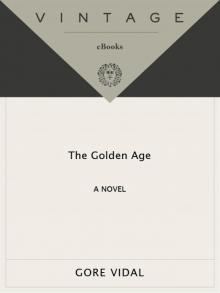 The Golden Age: A Novel
The Golden Age: A Novel Death Before Bedtime
Death Before Bedtime Burr
Burr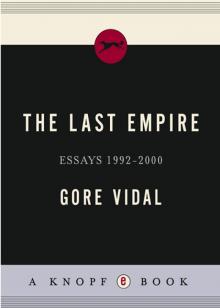 The Last Empire
The Last Empire Empire: A Novel
Empire: A Novel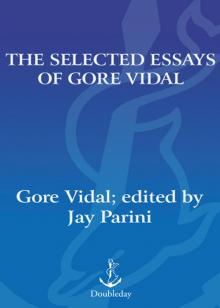 The Selected Essays of Gore Vidal
The Selected Essays of Gore Vidal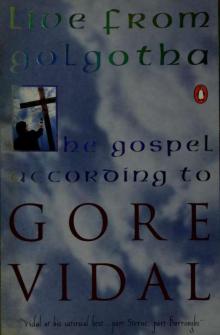 Live From Golgotha
Live From Golgotha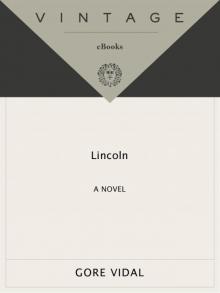 Lincoln
Lincoln Death Likes It Hot
Death Likes It Hot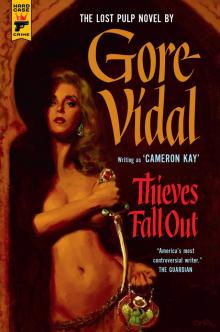 Thieves Fall Out (Hard Case Crime)
Thieves Fall Out (Hard Case Crime) Point to Point Navigation
Point to Point Navigation Williwaw
Williwaw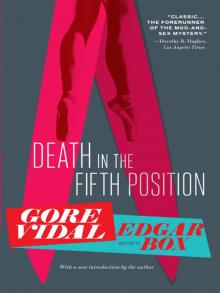 Death in the Fifth Position
Death in the Fifth Position In a Yellow Wood
In a Yellow Wood Julian
Julian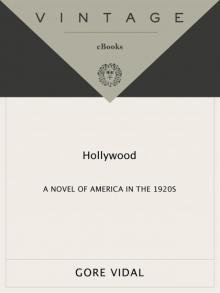 Hollywood
Hollywood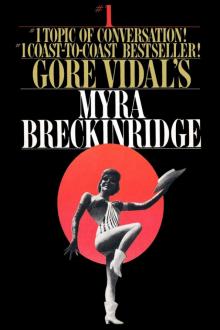 Myra Breckinridge
Myra Breckinridge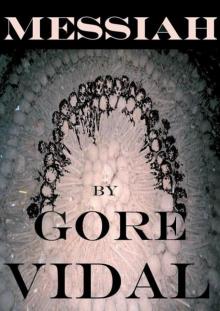 Messiah
Messiah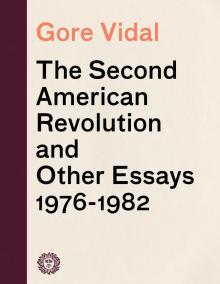 The Second American Revolution and Other Essays 1976--1982
The Second American Revolution and Other Essays 1976--1982 Homage to Daniel Shays
Homage to Daniel Shays Empire
Empire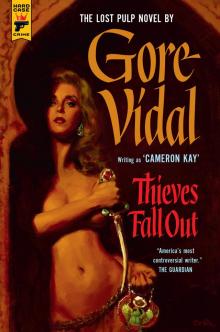 Thieves Fall Out
Thieves Fall Out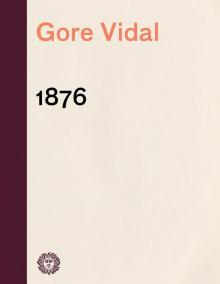 1876
1876 The City and the Pillar
The City and the Pillar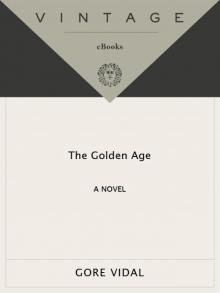 The Golden Age
The Golden Age At Home
At Home